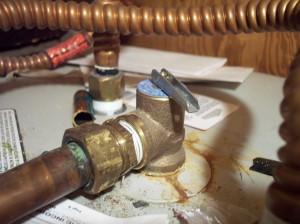Not even 18 hours after I wrote the previous post, our water heater’s relief valve decided to relieve itself.

Water heater pressure and temperature relief valve. The valve releases water into the pipe (shown), which in turn releases water onto your basement floor (not shown).
Fortunately for us it didn’t flood very much. The water was about an inch deep in the middle of the basement (a concrete floor with no sump or drain) and was dry along much of the basement walls. I was easily able to reach the water supply cut-off valve and stanch the flow. Most worrisome is that the bottom of our expensive new furnace was submerged—though thankfully none of the internal components got wet—so I’ll need to keep an eye out for rusting for awhile.
The plumber’s working theory is:
- We had the temperature set higher than necessary (about 135 degrees);
- the old temperature control module somehow caused the temperature to rise much hotter than the setting;
- the relief valve opened due to overheating; and
- the relief valve stuck open due to sediment in the tank.
We now have a shiny new relief valve, several shiny new water sensor alarms, and a shiny new bill for emergency service from our plumber.
Other things that were helpful to have on hand:
- Wet/dry vacuum. We have a model that is able to empty itself automatically via a garden hose attached to the pump exhaust. Without this feature you’ll spend 10 minutes emptying the bucket for every 1 minute you spend vacuuming up the flood.
- Dehumidifier. We have a model that automatically pumps its contents into the basement sink via a supplied 18-foot hose.
- Box fan.
- Shop towels.
- Large garbage bags into which to put the sodden contents of the cardboard boxes that just yesterday you moved from shelves onto the floor “just for a couple days.”
While waiting for the plumber we spent a day with the water heater shut off. And holy smokes, Boston tap water is cold this time of year.
It could have been much, much worse. I went to the basement yesterday morning just to see if there was any seepage through the basement walls from the heavy rain outside. (And good news: I didn’t see any seepage from the walls.) If it hadn’t been raining we probably wouldn’t have noticed anything amiss until the flooding shorted out the main electrical panel, which at that point would have represented tens of thousands of dollars of damage and the loss of our “claims free discount” from the insurance company.
$10 water sensor alarms are your friend.